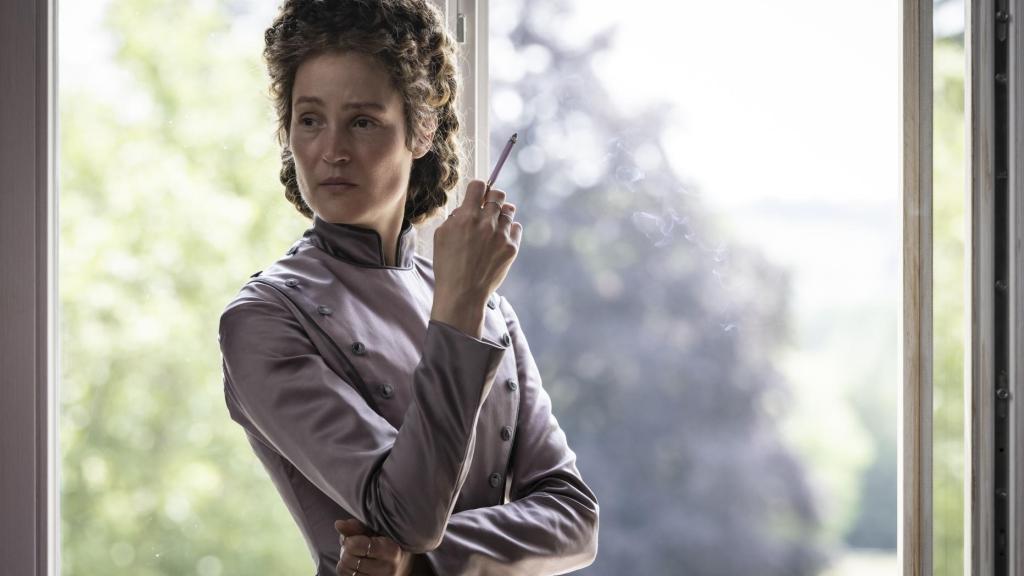A gem of razor-sharp storytelling, Austrian writer-direcor Marie Kreutzer’s subversive Corsage (2022), starring the radiant Vicky Krieps as the maverick Empress Elisabeth of Austria, the famous Sisi, apparently is only one of five films made in the last few years on the topic of the royal once hailed to be the most beautiful woman of Europe.
Her truly stunning looks were also to be her curse, an obsession that lasted a life-time, as she was always in the public eye, prompting her to devise increasingly strenuous exercises for herself, which included elaborate in-palace gyms, ice-water swimming, avid horse-riding, along with eating sliced oranges for dinner, measuring herself every day, and above all – binding herself in tight corsage, to achieve the wasp-like waist she was so admired for.
Far more intelligent than a range of pompous Habsburg courtiers, she was terrifically politically astute, perhaps even more so than her sturdy, roving husband Franz Joseph of Austria (Florian Teichtmeister), and certainly more sceptical of social mores than her perceptive, loyal son Crown Prince Rudolf (Aaron Friesz), the romantically doomed princeling of Mayerling. Nevertheless, she languished in her golden cage, essentially a luxurious waiting room, unable to truly influence the policies of the Court, increasingly driven to bouts of suicidal melancholia, bizarre behaviour, and passionate wanderlust.
All of which makes her the perfect vehicle for projections of a very contemporary sense of feminist unease.
Speaking after its screening at Toronto International Film Festival 2022, Kreutzer talks about the look of the film being “as if the expensive furniture had already been sold.” And indeed, the depicted royal life seems already spent in preceding glory, an after-thought of Empire, all dull yellows & pale blues, lights dimmed as was the political power.
Juxtaposed to the film it could be initially compared with, Sophia Coppola‘s Marie Antoinette, it is far less self-aware, more straight-forward in sentiment, favouring an unvarnished, sharply sceptical look at the trappings of monarchy and, therefore, significantly more punk-rock at its core.
When a performing orchestra starts playing a Beatles cover, it takes a long minute for the audience to figure out that what they are listening to might not be era-appropriate.
Nevertheless, while Corsage might be outwardly grim, it is also pretty playful and wryly humorous. Dark, Mitteleuropa-style humorous.
We meet the free-spirited, albeit vain Sisi as she meets her forties, in 1878, increasingly stifled and irritated by her static predicament, imperious and generous in equal measure, travelling widely across Europe, while offering sweets (candied violets) to wounded soldiers at home, sharing smokes with them, dressed in dark purple, and empathetically patronising women’s asylums (her favourite charities). In her travels she acquires twin tattoos with her doppelgänger lady-in-waiting Countess Marie Festetics (Katharina Lorenz), whom she endlessly exploits for emotional support, she rides her beloved horse to exhaustion when failing to bed a (perhaps) ex-lover (Colin Morgan), and smoothly switches between languages while musing philosophically with her soul-twin, and cousin Ludwig II, King of Bavaria (Manuel Rubey). Sisi also (perhaps) shoots some of the earliest film footage with Louis Le Prince (Finnegan Oldfield), flips the bird to the gathered aristocracy at a state dinner, and finally, inevitably, lets it all go to exquisite hell, in a manner that was also entirely expected, yet not (perhaps) historically accurate.
Corsage is a tour-de-force of precision filmmaking, with heartfelt, impeccable performances, the actors deeply invested in the vulnerable pulsating truth beneath the manicured layers of history, with the delicate photography capturing cracks which let the light creep in, leaving the the grandiosity of palatial spaces to languish in the background. The sparse dialogue is shred of banalities – while dense with humour and subdued suffering.
Set up to be half-fiction, half-fact (and quite a lot of our collective past is just that) – Corsage executes this clever agenda in such a disorientating manner as to never allow the viewer a glimpse into its shift in cognitive gears; ingenious in framing history as an elliptical loop of vanishing hormonal cycles of a seemingly celebrated, essentially dissed renegade queen.
It’s a unique experience, capturing an interiority so flawlessly flawed, almost anyone can find a reflexion of their own ennui, within.
★★★★★
Author: ©Milana Vujkov
